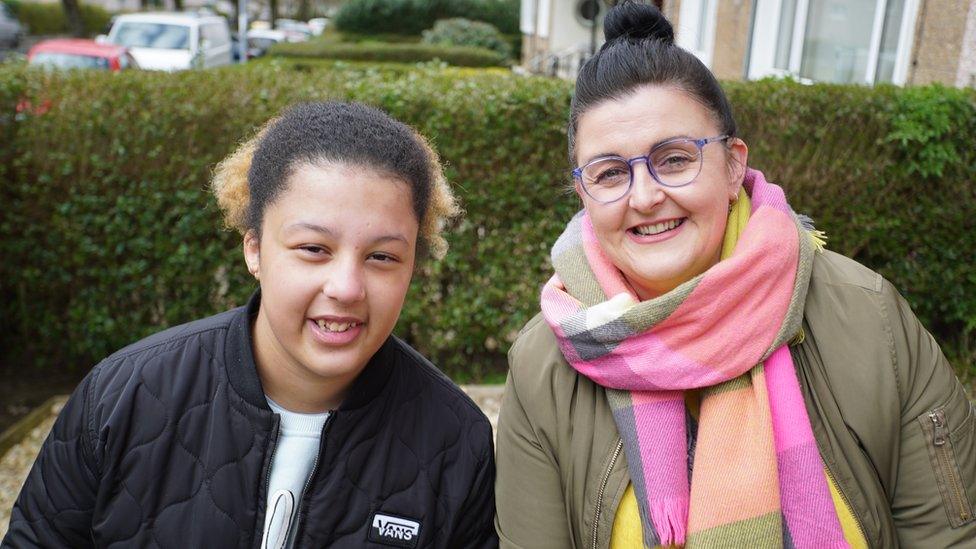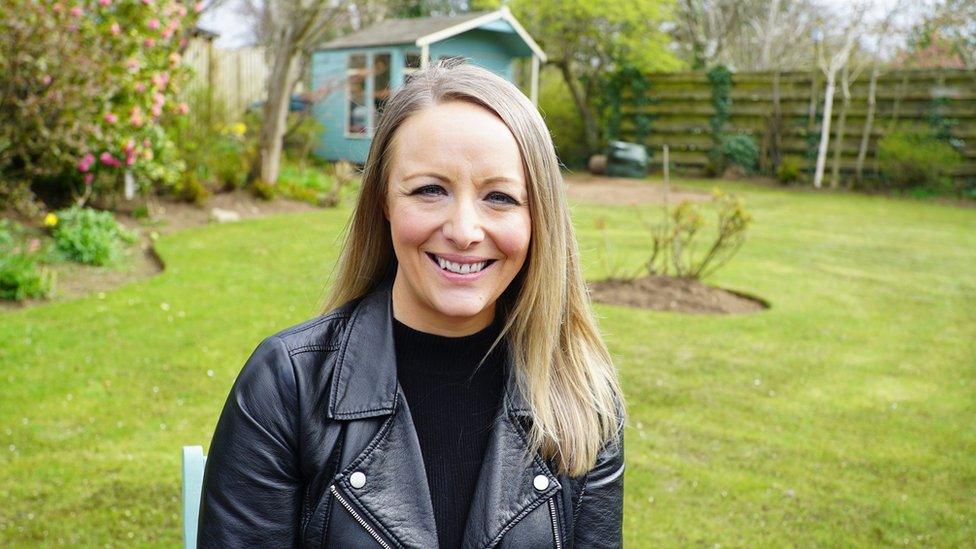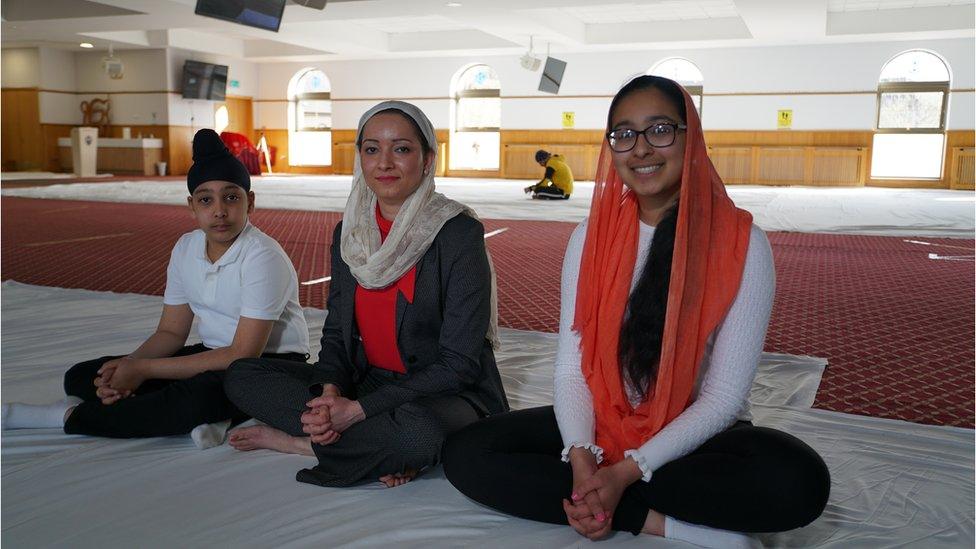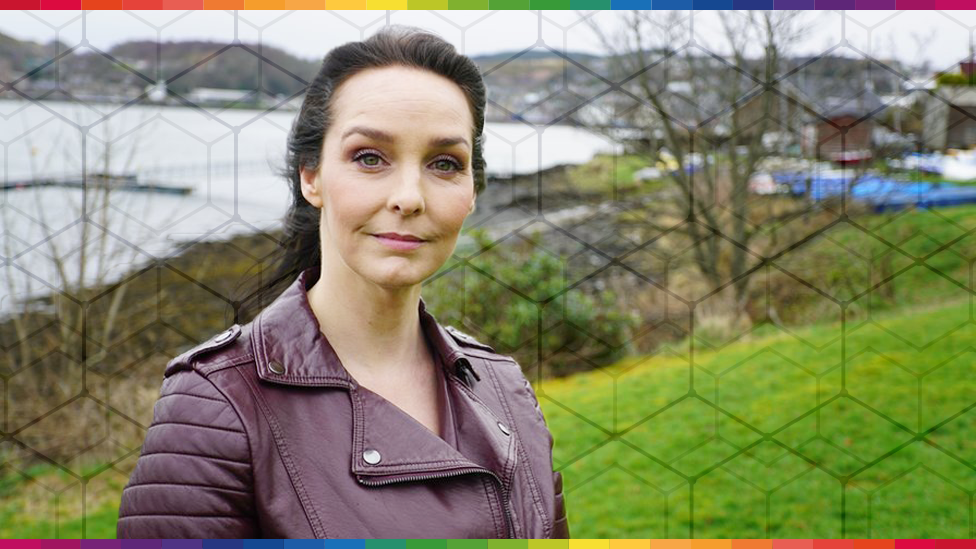Scottish election 2021: How will pupils catch up on lost education?
- Published

Cleoné and her mother Leanne say there is no way they could afford a tutor if they had to pay for it
Like many other 14-year-olds Cleoné enjoys art, music and Marvel movies but she sometimes finds school a struggle, especially during the past year of classroom disruption and remote learning.
Cleoné lives in a part of Glasgow where private lessons outside school are not usually an option but she is pleased to have had help from volunteer tutor Kim Williams.
"It's fun and she's really nice," says Cleoné, explaining that in a busy classroom it can sometimes be hard to attract a teacher's attention when you don't understand something.
With Kim all she has to do is ask, she says.
Her mum, Leanne McGuire, says: "There is no way that I would be able to afford a tutor for Cleoné had I had to pay for it.
"There's always going to be some young people that need that extra support but at the moment it feels like if you've got the money then it will be available to you. If you don't, then it's not going to be available."

Kim says it would be lovely if all students could have access to private tutoring
Cleoné's tutor Kim works for the Volunteer Tutors Organisation (VTO), a charity founded in 1977 to provide one-to-one support and guidance to children from disadvantaged backgrounds.
She says: "The pandemic has forced us to look at the additional support that's available outwith the classroom."
Not every student needs or requires personal tuition, she says, but many do find it helpful and in an ideal world it would be available to all regardless of their ability to pay.
"These students are maybe not the students that might put their hand up in class or admit to struggling," Kim says.
"I think it would be lovely if all students could have access to private tutoring should they need it or require it."

SCOTLAND ALERTS: Get extra updates on BBC election coverage

The gap in educational attainment between children from the richest and poorest families was a problem long before the arrival of Covid-19.
In 2015, First Minister and Scottish National Party leader Nicola Sturgeon said addressing it was how she wanted to be judged in office, insisting she had put her "neck on the line" over education, external.
The SNP says progress has been made but a report last month from public spending watchdog Audit Scotland concluded that "the poverty-related attainment gap remains wide and existing inequalities have been exacerbated by the Covid-19 pandemic", external.
All of the main parties are now promising action on education at the Scottish Parliament election on 6 May - with pledges including more teachers, more tutors, better access to technology and an expansion of eligibility for free school meals.
In civic Scotland too there is now a lively debate about the future of education, with suggestions that this is the moment to radically redesign the entire system, perhaps by embracing a Nordic model of teaching children through play until the age of seven or by scrapping formal exams entirely.
A new report from the Jimmy Reid Foundation, a left-wing think tank, recommends that all education should be free, with "no place for private schools in a country which sees education as a public good", external.
Reform Scotland, which describes itself as a centrist think tank, proposes an extra eight hours of tuition per week for the next two years to help repair the damage caused to children by education lost during the lockdowns, external.

Jaspreet Kaur is a teacher at a state school but her children go to a private school
Jaspreet Kaur is in a good position to compare the public and private sectors. She teaches chemistry at a state school in Glasgow while paying for her children to attend a private school in the city.
She insists the quality of education being provided by the state is good but she also reckons the private sector's access to greater resources during the pandemic helped it to respond more nimbly in the switch to online learning.
Teachers in the private sector, she said, were generally more IT-literate with better access to computers and tablets so "when it came to delivering lessons online, private schools were already a step ahead".
While her state school was offering one live lesson per week, she explained, her daughter was able to benefit from face-to-face online tuition every day.
There has already been a noticeable increase in the attainment gap as a result of the pandemic, says Jaspreet, with pupils' abilities, motivation, IT skills, access to technology and parental involvement in their education all playing a part in whether they are pulling ahead, remaining static or falling behind.
She does not see any reason why state schools should not be able to provide the same level of support which private schools have been able to offer over the past year.

SCOTLAND'S ELECTION: THE BASICS
What's happening? On 6 May, people across Scotland will vote to elect 129 Members of the Scottish Parliament (MSPs). The party that wins the most seats will form the government. Find out more here.
What powers do they have? MSPs pass laws on aspects of life in Scotland such as health, education and transport - and have some powers over tax and welfare benefits.
Who can vote? Anyone who lives in Scotland, is registered to vote and aged 16 or over on 6 May is eligible. You can register to vote online, external.

The focus now, says Jaspreet, needs to be on the mental and physical health of pupils, support to improve teachers' IT skills, and additional resources for pupils who have fallen behind.
Tutor Kim Williams agrees.
"It's about supporting them and it's about making them feel good about their learning experience and making them feel that they can do it," she says.
"These are the skills that ultimately they'll carry through for the rest of their life," Kim adds.
Without action, says Leanne McGuire, children from richer families with access to better educational resources are "going to continue to develop further and improve further and it's just going to be harder for the young people that don't have that access".

POLICIES: Who should I vote for?
CANDIDATES: Who can I vote for in my area?
PODLITICAL: Updates from the campaign

- Published14 April 2021
